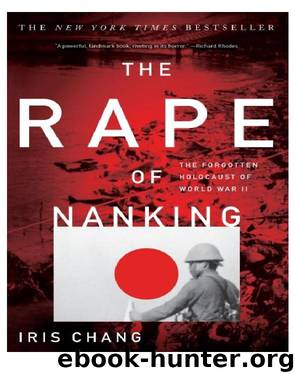The Rape Of Nanking by Iris Chang

Author:Iris Chang [Chang, Iris]
Language: eng
Format: epub, mobi
Publisher: Basic Books
Published: 2011-12-28T13:00:00+00:00
In January 1938, not one shop was officially open in Nanking except for a military store and the International Committee’s rice shop. The harbor was practically empty of ships. Most of the city lacked electricity, telephone, and water service because the Japanese had rounded up and executed some fifty employees from the local power plant. (The lack of running water made it difficult to bathe, but many women chose not to bathe anyway, in hopes that their unwashed flesh would repel Japanese soldiers intent on raping them.)
Slowly the city came back to life. People could be seen ransacking houses throughout Nanking—ripping out floorboards and wood paneling for firewood and carting away metal and brick to repair their own homes or to sell on the streets to others. On Shanghai Road in the Safety Zone, dense crowds of people clustered before hundreds of vendors who sold every kind of loot imaginable, including doors and windows. This activity jump-started the local economy, for next to the roadside merchants of booty mushroomed new teahouses and restaurants.
On January 1, 1938, the Japanese inaugurated a new city government: the Nanking Self-Government Committee (the Nanjing zizhi weiyuanhui)—or “Autonomous Government,” as some of the Westerners in the city called it. The Self-Government Committee was staffed with Chinese puppet officials who controlled the city’s administration, welfare, finance, police, commerce, and traffic. By spring Nanking was outwardly starting to function like a normal city again. Running water, electric lighting, and daily mail service resumed. A Japanese city bus service started, rickshas appeared in the streets, and people could take the train from Nanking to Shanghai. Nanking quickly became a busy shipping center for the Japanese as small locomotives, horses, field pieces, trucks, and other supplies were ferried daily from the city to nearby Pukow.
But signs of a brutal occupation were everywhere. Chinese merchants endured heavy taxes and rent extortion to finance the salaries of the new officials in power. The Japanese also opened up military shops for the Chinese populace that drained the city of Chinese gold and money and replaced it with worthless military currency. The Chinese puppet government compounded the poverty by confiscating valuables and stocks of inventory that remained in the city, even if the owner was still in town, leading some of the lower Chinese officials to joke cynically among themselves: “We are now doing an authorized plundering.”
Far more alarming than the exploitation of the populace by taxes and confiscation was the reappearance of opium in the city. Before the Japanese occupation, opium was an underground narcotic, secretly smoked in the back rooms of Nanking by aristocrats and merchants. But it was not sold openly and brazenly in the streets, nor was it conspicuously paraded before young people. After the fall of the city, people could freely stroll into opium dens without interference from the police. These dens boldly advertised the drug with Chinese character shingles marked Kuang To, or “Official Earth”—a term used for opium.
To encourage addiction and further enslave the people, the Japanese routinely used narcotics as payment for labor and prostitution in Nanking.
Download
This site does not store any files on its server. We only index and link to content provided by other sites. Please contact the content providers to delete copyright contents if any and email us, we'll remove relevant links or contents immediately.
| Africa | Americas |
| Arctic & Antarctica | Asia |
| Australia & Oceania | Europe |
| Middle East | Russia |
| United States | World |
| Ancient Civilizations | Military |
| Historical Study & Educational Resources |
The Alienist by Caleb Carr(1541)
The Analects of Confucius by Burton Watson(1141)
On China by Henry Kissinger(1113)
China in Ten Words by Yu Hua(987)
The Last Kings of Shanghai by Jonathan Kaufman(969)
One Bright Moon by Andrew Kwong(861)
Deng Xiaoping and the Transformation of China by Vogel Ezra F(838)
Mao's Last Dancer by Li Cunxin(820)
Three Tigers, One Mountain by Michael Booth(796)
Midnight in Peking by Paul French(792)
Seven Years in Tibet by Heinrich Harrer(790)
The Snakehead: An Epic Tale of the Chinatown Underworld and the American Dream by Patrick Radden Keefe(785)
Big Sister, Little Sister, Red Sister by Jung Chang(738)
Tiger Trap by David Wise(696)
Ancient Chinese Warfare by Ralph D. Sawyer(682)
Modern China. A Very Short Introduction by Rana Mitter(638)
The Open Road by Pico Iyer(629)
Chinese Theology by Chloë Starr(621)
Riding the Iron Rooster by Paul Theroux(615)
